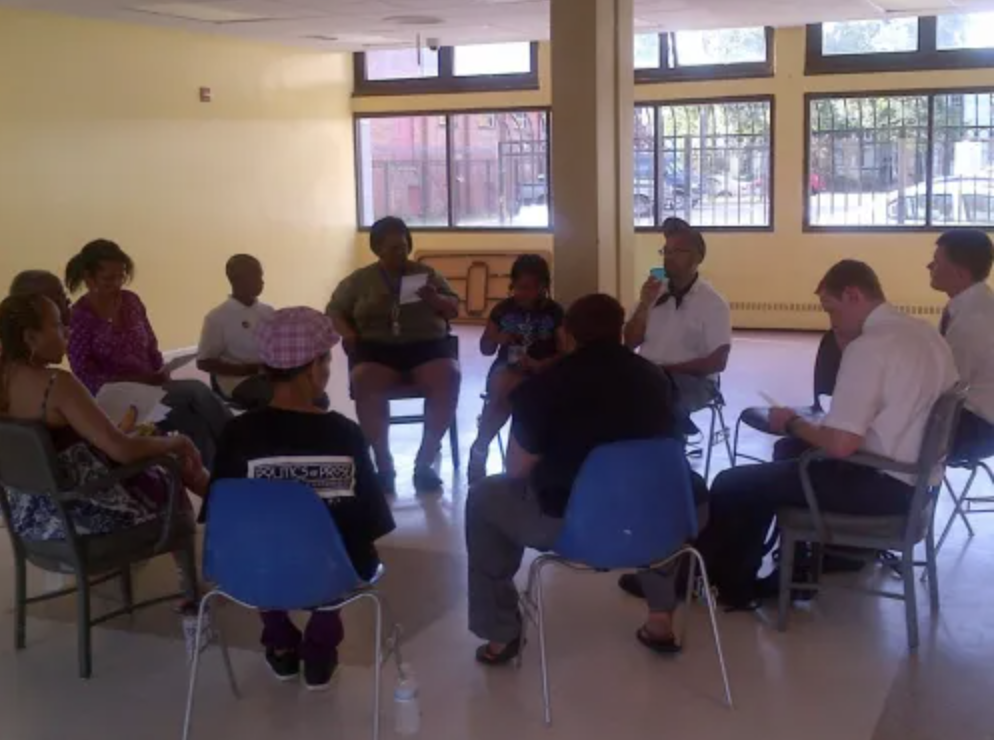Five Reasons You Should Join Your Tenant Association
By Caroline, on October 16th, 2013
Tenant Associations are important community groups where residents of a property come together to address all kinds of issues relevant to the place they live. If united and strong, these groups can be instrumental in shaping the living environment of all residents. Here are five important reasons you should join or form tenant association where you live.
Potomac Gardens Residents
1. It’s a lot more fun (and probably much less time consuming) than you might think!
In addition to meeting to discuss issues within the building, problems with management, leaky pipes, and what to do about neighbors’ pets who continually take care of business mid-sidewalk, many tenant associations also gather to organize block parties, bake sales, barbecues for residents of the building, and other social events. Joining your tenant association can be a great way to get to know your neighbors and have a little fun with them too! Also, most tenant associations only meet about once a month for an evening or a couple hours. It’s well worth it, and really doesn’t take up too much time.
2. Power in numbers
Often a negligent management company will suddenly come to attention when confronted by an articulate tenant organization. Legally there may not be much difference between Joe Shmo the Tenant asking the rental office for the fifth time to fix his leaky faucet, and the 100 Maple Street United Tenant Association urging management to see to it that the necessary repairs get made to bring the building into compliance with housing code before other legal recourse be taken, but logically the likelihood of a quick positive response is higher in the second scenario. Every tenant needs a landlord who respects their rights and person, and the voice we all have to demand this is stronger and more audible when we speak up together.
3. You can buy your building!
Potomac Gardens Tenant Meeting
In contrast to most other US cities, DC tenants are afforded the infamous TOPA rights, or the first right to buy their building under the Tenant Opportunity to Purchase Act. This right kicks in at the sale of a rental building and each renter in the building should receive an Offer of Sale by certified mail. For many of us renting our homes an “offer of Sale” would seemingly merit an obvious No, and “I can’t afford to buy my building” or “I don’t want to get wrapped up in any of that”, but TOPA rights are worth a second look. First of all, in a tenant-run building, usually known as a limited equity cooperative, what tenants pay in “co op fees” can sometimes actually be lower than what a tenant may have paid as rent. In a building owned and managed by a for profit entity, a tenant’s rent not only goes toward maintenance, utilities, and other general expenses of the building, but it also goes toward any profit made off the property. When tenants run their own building they cut out the profit margin, and co op fees are often comparable to what they previously paid in rent.
Most importantly, even if the tenants of a building don’t have any interest in purchasing the building themselves, tenants’ right to purchase is assignable. This means that without showing a single shred of financial information tenants can put a hold on the sale for up to four months, negotiate during that time with any entity interested in purchasing the property, and assign their rights to purchase to whoever they chose and see most fit to be their future landlord. At the end of four months the deposit needs to be put down by whoever is interested in buying the building to be able to continue to negotiate. If not, the TOPA rights simply expire and the landlord can sell the building to whoever they had planned to start, with no skin off any tenants’ back.
4. Long term affordability and gentrification in your neighborhood.
Being a part of your tenant association not only allows you to be stronger in addressing your own and other tenants’ concerns within your building community. It also can give you the opportunity to impact the larger trends in your neighborhood and have a voice in the long term affordability of the neighborhood and city where you live. Through the tenant opportunity to purchase, but also by simply by being an active, vocal member of your building’s association, you can make your concerns about your community in 5, 10, 25 years down the line heard. Rent control in DC is a great example of this, since the protection of rent control, or the limitation on rent increases to a once-yearly, government regulated increase that applies to most rental properties can usually only be lifted from a building when 70 percent of the tenants sign a landlord’s petition, or voluntary agreement, allowing rent control to be taken away from their building. A strong, united, well informed tenant association in place helps all residents to understand this and similar processes and thus allows them to make informed choices on things that may affect the future of their building for a long time to come.
Potomac Gardens Cook Out
5. Community, community, community
It’s what makes a house a home, and what can turn a living space into a warm, safe and welcoming environment. Tenant associations are a way for residents to show they care about the people and place where they live, and to invest a little time and energy in the future of whatever building, neighborhood, and city we call home.




